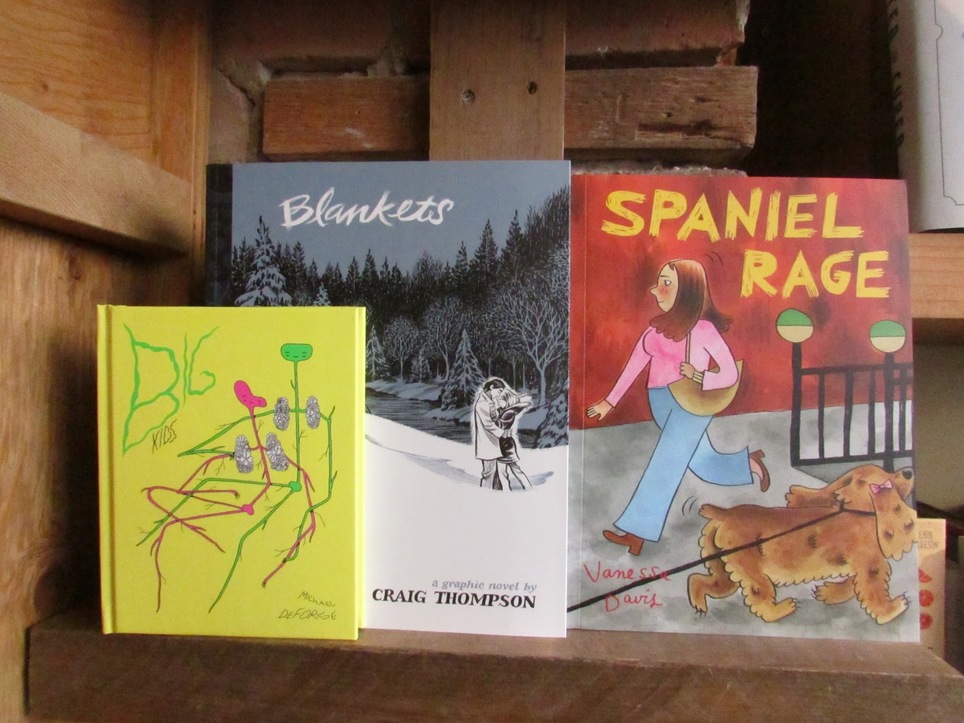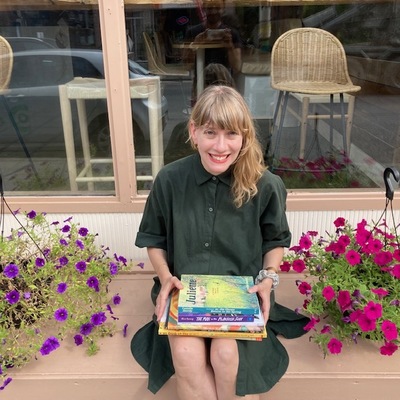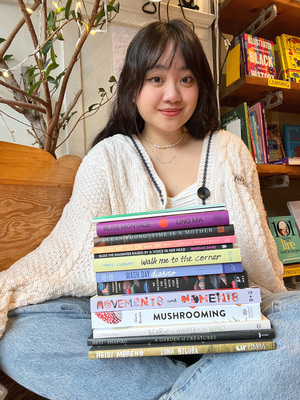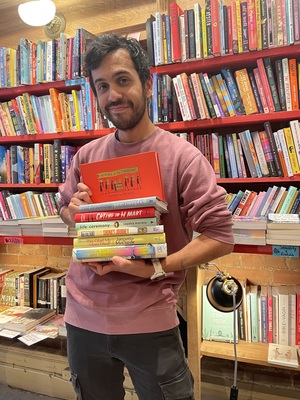Summer Reads 2017: Luke
July 2, 2017

A summer reading list: why not a story that takes place in the snow-dusted silence of a Midwestern childhood? Of course Blankets transcends Wisconsin and Michigan. It is so much more than a love story or a coming of age story. We weave through memory, helplessness, euphoria, self-loathing, high school corridors, family and religious dynamics and Craig Thompson`s world of deep feeling. He courageously reveals intensely personal anguish ridden episodes of his life while also showcasing an utmost joy (seemingly) specific to adolescence.
Vanessa Davis - Spaniel Rage
These comics give insight into the process of making comics, personal anecdotes & contain stories that are at times poignant and at times hilarious. The cover and first story are illustrated with the same beautiful full-colour palate that shuffles in and out of Davis’ Make Me A Woman, while the rest of the book is in crisp black and white. At times we can see errant lines that Davis has chosen not to erase. This unvarnished style provides an even more personal feel to this collection of diary comics and drawings from her sketchbooks from 2003-2004.
Michael DeForge - Big Kids
The perfect book to keep in a pocket to pull out during any summer downtime. DeForge’s Big Kids is creative, minimalist & yet highly narrative. Big Kids has charming characters, oozes with romance & explicit themes, and is dreamy in its use of colour. In his signature style, DeForge recounts the story of high school love, adolescent transformations and new dimensions. Big Kids is blunt and mysterious, masterful and weird.
Edited by Carolina De Robertis - Radical Hope : Letters of Love and Dissent in Dangerous Times
I am very much enjoying reading this epistolary collection edited by Carolina de Robertis. Such diversity of voice. Grounding to hear Junot Diaz as if he were talking to a close friend, Lisa See talking to her 4 year old grandson, Jewelle Gomez writing to her late grandmother, and many others. The letters are personal & intimate. As is politics, where real bodies are hurt, real families separated. It's been great to read correspondence that touches on such a grand swath of issues of the moment. The book is helping coax me out of a shock (that so many of us are still in, no?).
Naomi Klein – No Is Not Enough
In This Changes Everything, Klein lays out the ways in which we are in decade zero for climate action to prevent catastrophic, runaway climate change. The brilliant journalism, incisive analysis, and incredible tact in being at seemingly perfect locations to cover so many important events, showcases Klein`s genius. The book zooms in on our cognitive dissonance and compels us to act: the climate battle is something that no one should shy away from. I highly anticipate her follow up – No Is Not Enough which Bill McKibben blurbs as being “not just the first word on Trump, but in powerful ways the last word as well.”
Rebecca Solnit - Wanderlust: A History of Walking
After devouring a stack of her texts of late, Rebecca Solnit is still what I want to be reading all of the time. So much of what I read in the current events realm seems to point back to her thinking. I find it astounding that Hope In the Dark was written in 2004, and not in the aftermath of November, 2016. Her essay "Men Explain Lolita to Me" in The Mother of All Questions paired so well with Sarah Weinman’s article in Hazlitt "The Real Lolita". A Field Guide to Getting Lost harmonized with last year's outdoor reading season. Here’s to hoping Wanderlust goes well with the upcoming summer months.
A book examining loss, personal and collective grieving & the eulogy in contemporary society: summery indeed, no!? Julia Cooper explores the ways in which we have difficulty as a society discussing death without oversimplifying or limiting. Loss is something we will all endure and strikes in any and every season. Cooper’s thrilling tone in The Last Word is at once personal, academic, and pop cultural. She discusses public grieving in Black Lives Matter Movements and provides historical context as well for numerous celebrity deaths including those of Leonard Cohen, Prince, David Bowie, Whitney Houston & Michael Jackson. The Last Word shows us how alienating it can be to confront personal loss in the face of a society that expects us to grieve in such rapid and formulaic ways. She meditates on the discomfort that comes with death and calls for more space to be given for that discomfort. She even highlights the way certain social media companies profit from online grieving. #enjoyingthisread #summeryindeed
Magda Szabo - The Door
Like many others, ever since finishing that four part series that takes place in Naples (& elsewhere) I have been searching for an equivalent. Why is it so difficult to find something that is as satisfying as the Neapolitan Novels? I’ve perused lists of equivalents and have yet to be convinced. Perhaps I don't want to be. Comparisons can be limiting after all. The Door seems indeed to have much in common with the Neapolitan Novels: both explore the relationship of two female protagonists, one of whom is a writer. Both deal with poverty, societal pressure, “craziness,” and the literary and illiterate. Both have appeared in translation years after the original. But comparisons are the worst! I look forward to giving this Szabo book a try for it’s own sake.
Durga Chew Bose - Too Much and Not the Mood
Durga Chew Bose`s Too Much and Not the Mood succeeds heartily in achieving an inconclusive, perpetual arriving at, which keeps the reader`s attention. Her witty, dense essays are readable and challenging. The book contains discussions of New York City in the summer, childhood & family dynamics, reading & study, travel anecdotes, upspeak, and (90s era) basketball (stars). Yes, this book has been great indeed to read in full shade, full sun nearby.
Alejandra Pizarnik - Extracting the Stone of Madness
One thing I am very much enjoying about Extracting the Stone of Madness, translated Yvette Siegert, is the fact that it is a bilingual edition. I love seeing how the translator grapples with the original: “Es muro es meur muro es mundo mira muere.” I love how the French (which Pizarnik often uses) in the original so often goes untranslated. The poems have strong themes of childhood (lots of dolls!), death, isolation, madness. An intense & mysterious collection from the last decade of Pizarnik’s life.
Bonne lecture!


